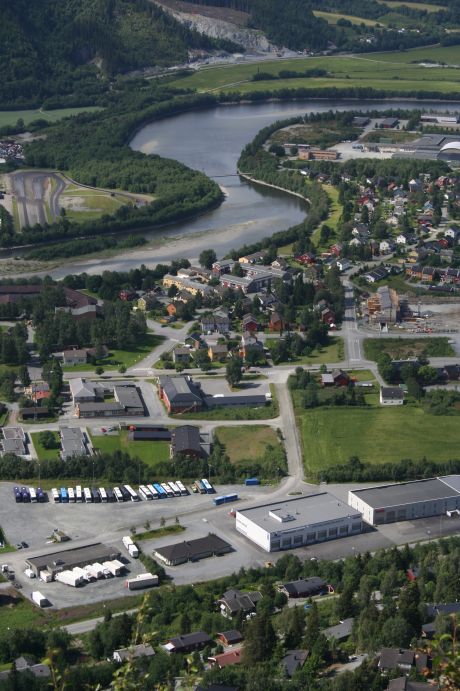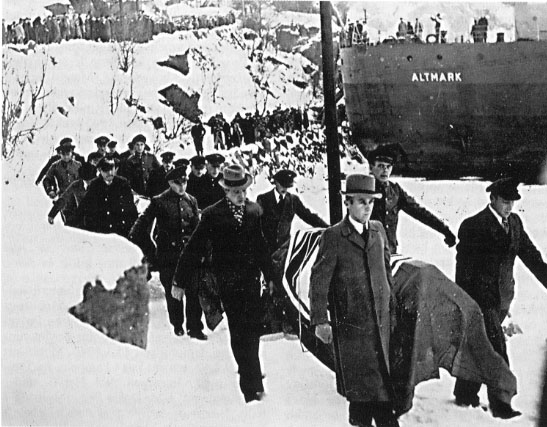|
Eiliv Skard
Eiliv Skard (19 October 1898 – 30 September 1978) was a Norwegian classical philologist. Personal life He was born in Levanger as a son of educators Matias Skard (1846–1927) and Gyda Christensen (1868–1916). The family moved to Kristiansand in 1901. He was a nephew of Johannes Skar and Christopher Bruun, a brother of Bjarne and Sigmund Skard and a half-brother of Olav and Torfinn Skard. When Sigmund Skard married Åse Gruda Skard, Åsa became Eiliv's sister-in-law. In 1940 he married teacher Sigrid Nordang (1903–1988). They had met in Gudbrandsdalen in the same year. Career He finished his secondary education at Kristiansand Cathedral School in 1916, and graduated from the Royal Frederick University in 1922. He worked at the secondary schools in Hornnes from 1922 to 1924 and Orkdal 1925 to 1929. He was a Latin teacher at the university from 1929, having specialized in classical philology during studies in Germany, Italy and Greece. He took the dr.philos. ... [...More Info...] [...Related Items...] OR: [Wikipedia] [Google] [Baidu] |
Classical Philology
Classics or classical studies is the study of classical antiquity. In the Western world, classics traditionally refers to the study of Classical Greek and Roman literature and their related original languages, Ancient Greek and Latin. Classics also includes Greco-Roman philosophy, history, archaeology, anthropology, art, mythology and society as secondary subjects. In Western civilization, the study of the Greek and Roman classics was traditionally considered to be the foundation of the humanities, and has, therefore, traditionally been the cornerstone of a typical elite European education. Etymology The word ''classics'' is derived from the Latin adjective '' classicus'', meaning "belonging to the highest class of citizens." The word was originally used to describe the members of the Patricians, the highest class in ancient Rome. By the 2nd century AD the word was used in literary criticism to describe writers of the highest quality. For example, Aulus Gellius, in his ''Att ... [...More Info...] [...Related Items...] OR: [Wikipedia] [Google] [Baidu] |
Orkdal
Orkdal is a former municipality in Trøndelag county, Norway. The municipality existed from 1838 until its dissolution in 2020 when it joined Orkland Municipality. It was part of the Orkdalen region. The administrative centre of the municipality was the city of Orkanger. Some of the notable villages in the municipality included Kjøra, Geitastrand, Gjølme, Thamshavn, Fannrem, Vormstad, Svorkmo, and Hoston. Agriculture plays a significant role in the municipality. The Thamshavnbanen was used to transport ore from Løkken Verk to the port of Thamshavn, and is now a vintage railway. The Fannrem concentration camp was located in Fannrem during World War II. Orkanger is one of the main industrial hubs in central Norway. The industry is mainly located around Grønøra Industrial park. The largest companies are Technip Offshore Norge AS, Reinertsen, Washington Mills and Elkem Thamshavn AS. At the time of its dissolution in 2020, the municipality was the 188th largest by ... [...More Info...] [...Related Items...] OR: [Wikipedia] [Google] [Baidu] |
Nils Johan Ringdal
Nils Johan Ringdal (6 March 1952 – 11 September 2008) was a Norwegian author and historian, known mostly for his works on Norwegian occupation history and Norwegian cultural history, and for his controversial book "''Nationaltheaterets Historie 1899-1999''" ''(The History of the National Theater 1899-1999)''. Ringdal had been living in various countries in Southeast Asia since 1988, along with his domestic partner Georg Petersen Georg Petersen (2 October 1820 – 20 December 1900) was a Danish businessman. He owned the building at Nyhavn 63 in Copenhagen. Early life and education Petersen was born on 2 October 1820, the son of wholesale merchant Friedrich Erasmi Petersen .... Ringdal was found dead on 11 September 2008 in Denpasar, Indonesia. References Dagbladet(in Norwegian)Aftenposten(in Norwegian)Verdens Gang(in Norwegian) 1952 births 2008 deaths Gay writers 20th-century Norwegian historians Norwegian LGBT writers LGBT historians 21st-century Norwegia ... [...More Info...] [...Related Items...] OR: [Wikipedia] [Google] [Baidu] |
Berit Nøkleby
Berit Nøkleby (25 September 1939 – 26 July 2018) was a Norwegian historian. She was born in Drammen, and is a cand.philol. by education. She has contributed to several books on the German occupation of Norway. She wrote book II and IV of the series ''Norge i krig I–VIII. Fremmedåk og frihetskamp 1940–1945'' (II: ''Nyordning'', 1985, and IV: ''Holdningskamp'', 1986). She wrote the book ''Josef Terboven. Hitlers mann i Norge'' (1992), and she was co-editor of the encyclopaedia ''Norsk Krigsleksikon 1940–1945 ''Norsk krigsleksikon 1940–1945'' is a Norwegian encyclopaedia covering the Second World War. It was issued in 1995 by the publishing house J.W. Cappelen. The editorial staff consisted of five editors: Hans Fredrik Dahl, Guri Hjeltnes, Berit N ...'' (1995). She died at the age of 78.Death announcement, ''Aftenposten'' 2 August 2018 p. 33 Selected works *''Nyordning'' (1985) *''Holdningskamp'' (1986) *''Pass godt på Tirpitz! : norske radioagenter i Secret ... [...More Info...] [...Related Items...] OR: [Wikipedia] [Google] [Baidu] |
Guri Hjeltnes
Guri Hjeltnes (born 23 October 1953) is a Norwegian journalist and historian. Having mainly researched Norwegian World War II history during her career, she is a professor of journalism at the BI Norwegian Business School since 2004. She has also spent considerable time as a journalist and commentator, currently in ''Verdens Gang''. She became director of the Center for Studies of the Holocaust and Religious Minorities in 2012. Career Guri Hjeltnes was born in Stavanger. She worked as a journalist in ''Arbeiderbladet'' from 1979 to 1985, and has also worked for other newspapers on a freelance basis. From the mid-1980s she concentrated mainly on research, although she worked part-time for ''Verdens Gang'' from 1991 as a book reviewer.Profile – |
Hans Fredrik Dahl
Hans Fredrik Dahl (born 16 October 1939) is a Norwegian historian, journalist and media scholar, best known in the English-speaking world for his biography of Vidkun Quisling, a Nazi collaborationist and Minister President for Norway during the Second World War. His research is focused on media history, the totalitarian ideologies of the 20th century, and the Second World War. He served as culture editor of ''Dagbladet'' 1978–1985 and has been a board member of the paper since 1996. He was a professor at the University of Oslo 1988–2009, and is now a professor emeritus. Personal life Dahl was born in Oslo, the son of Jacob Dahl, an engineer, and his wife Sophie Harbitz. He was married to jurist and pioneer of feminist jurisprudence Tove Stang Dahl (''née'' Tove Thiis Stang) from 1960 to 1993, and to art historian Elisabeth Elster from 1996. He is a maternal grandson of pathologist Francis Harbitz, and a cousin of historian Francis Sejersted. In his younger days he defined ... [...More Info...] [...Related Items...] OR: [Wikipedia] [Google] [Baidu] |
Norsk Krigsleksikon 1940-45
Norwegian, Norwayan, or Norsk may refer to: *Something of, from, or related to Norway, a country in northwestern Europe *Norwegians, both a nation and an ethnic group native to Norway *Demographics of Norway *The Norwegian language, including the two official written forms: **Bokmål, literally "book language", used by 85–90% of the population of Norway **Nynorsk, literally "New Norwegian", used by 10–15% of the population of Norway *The Norwegian Sea Norwegian or may also refer to: Norwegian *Norwegian Air Shuttle, an airline, trading as Norwegian **Norwegian Long Haul, a defunct subsidiary of Norwegian Air Shuttle, flying long-haul flights *Norwegian Air Lines, a former airline, merged with Scandinavian Airlines in 1951 *Norwegian coupling, used for narrow-gauge railways *Norwegian Cruise Line, a cruise line *Norwegian Elkhound, a canine breed. *Norwegian Forest cat, a domestic feline breed *Norwegian Red, a breed of dairy cattle *Norwegian Township, Schuylkill County, ... [...More Info...] [...Related Items...] OR: [Wikipedia] [Google] [Baidu] |
Gudbrandsdalen
Gudbrandsdalen (; en, Gudbrand Valley) is a valley and traditional district in the Norwegian county of Innlandet (formerly Oppland). The valley is oriented in a north-westerly direction from Lillehammer and the lake of Mjøsa, extending toward the Romsdalen valley. The river Gudbrandsdalslågen (Lågen) flows through the valley, starting from the lake Lesjaskogsvatnet and ending at the lake Mjøsa. The Otta river which flows through Otta valley is a major tributary to the main river Lågen. The valleys of the tributary rivers such as Otta and Gausa (Gausdal) are usually regarded as part of Gudbrandsdalen. The total area of the valley is calculated from the areas of the related municipalities. Gudbrandsdalen is the main valley in a web of smaller valleys. On the western (right hand) side there are long adjacent valleys: Ottadalen stretches from Otta village, Gausdal some from Lillehammer and Heidal some from Sjoa. Gudbrandsdalen runs between the major mountain ranges of Norw ... [...More Info...] [...Related Items...] OR: [Wikipedia] [Google] [Baidu] |
Operation Weserübung
Operation Weserübung (german: Unternehmen Weserübung , , 9 April – 10 June 1940) was Germany's assault on Denmark and Norway during the Second World War and the opening operation of the Norwegian Campaign. In the early morning of 9 April 1940 (''Wesertag'', "Weser Day"), Germany occupied Denmark and invaded Norway, ostensibly as a preventive manoeuvre against a planned, and openly discussed, French-British occupation of Norway known as Plan R 4 (actually developed as a response to any German aggression against Norway). After the occupation of Denmark (the Danish military was ordered to stand down as Denmark did not declare war with Germany), envoys of the Germans informed the governments of Denmark and Norway that the ''Wehrmacht'' had come to protect the countries' neutrality against Franco-British aggression. Significant differences in geography, location and climate between the two nations made the actual military operations very dissimilar. The invasion fleet's no ... [...More Info...] [...Related Items...] OR: [Wikipedia] [Google] [Baidu] |
Oxford Group
The Oxford Group was a Christian organization (first known as ''First Century Christian Fellowship'') founded by the American Lutheran minister Frank Buchman in 1921. Buchman believed that fear and selfishness were the root of all problems. Further, Buchman believed that the solution to living with fear and selfishness was to "surrender one's life over to God's plan". Buchman had had a conversion experience in an evangelical chapel in Keswick, England, when he attended a decisive sermon by Jessie Penn-Lewis in the course of the 1908 Keswick Convention. Later, but to him as result of that experience, he would, when resigning a part-time post at Hartford Seminary in 1921, found a movement called ''First Century Christian Fellowship''. By 1928 the Fellowship had come to be known as ''The Oxford Group'' or ''Oxford Groups''. ''The Oxford Group'' enjoyed wide popularity and success in the 1930s. In 1932 the Archbishop of Canterbury, Cosmo Lang, in summing up a discussion of ''The ... [...More Info...] [...Related Items...] OR: [Wikipedia] [Google] [Baidu] |
Anti-fascism
Anti-fascism is a political movement in opposition to fascist ideologies, groups and individuals. Beginning in European countries in the 1920s, it was at its most significant shortly before and during World War II, where the Axis powers were opposed by many countries forming the Allies of World War II and dozens of resistance movements worldwide. Anti-fascism has been an element of movements across the political spectrum and holding many different political positions such as anarchism, communism, pacifism, republicanism, social democracy, socialism and syndicalism as well as centrist, conservative, liberal and nationalist viewpoints. Fascism, a far-right ultra-nationalistic ideology best known for its use by the Italian Fascists and the Nazis, became prominent beginning in the 1910s while organization against fascism began around 1920. Fascism became the state ideology of Italy in 1922 and of Germany in 1933, spurring a large increase in anti-fascist action, including Germa ... [...More Info...] [...Related Items...] OR: [Wikipedia] [Google] [Baidu] |




